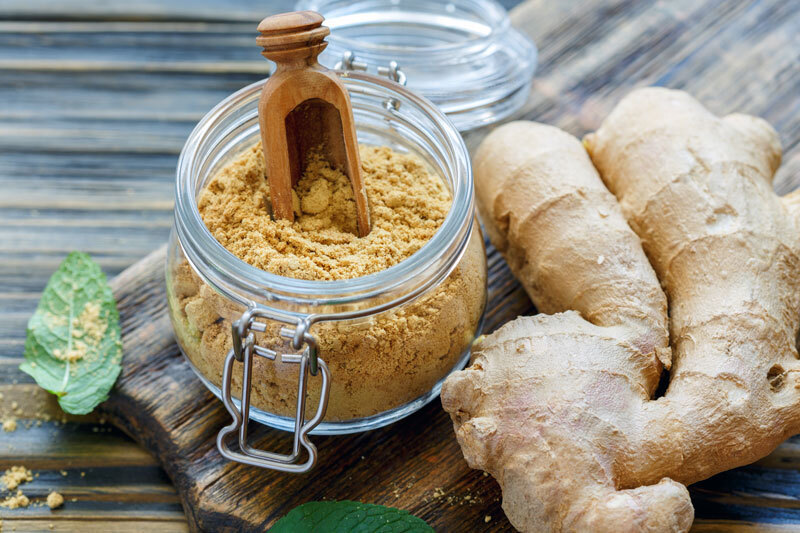Ginger, also known as Zingiber officinale, is well known for its potent medicinal properties. The root’s health benefits have been harnessed for thousands of years and are well-documented in modern clinical studies.
Since ancient times, ginger has played a massive role in Indian, Asian, and Arabic herbal medicine. In ancient India, ginger was called by its Sanskrit name, vishwabhesaj—or “universal medicine.” And since the fourth century B.C. it has been an essential ingredient and prized herb in traditional Chinese medicine.
Ginger’s spicy and warming taste has been harnessed to treat digestive upsets, nausea, intestinal gas and to stimulate circulation to the body’s extremities. In addition to its warming and stimulating properties, ginger’s health benefits are primarily due to its anti-inflammatory properties, antioxidant content, and therapeutic compounds like gingerol, zingerone, paradol, and shogaol.
Modern medicine prescribes ginger to treat nausea and vomiting associated with motion sickness, pregnancy, and chemotherapy. When consumed as a tea, ginger can help treat colds, flu, headaches, and painful menstruation. It can also be used to reduce pain and inflammation associated with arthritis and chronic fatigue.
You may be most familiar with ginger’s presence in delicious Asian cuisine or as a trusty addition to your morning cup of warm lemon water. (Or maybe you have fond memories of your mother bringing you a can of ginger ale and saltine crackers when you were sick)
In this article, we’re sharing the top benefits of ginger root and easy ways to get your daily dose. (Spoiler alert: we do not recommend buying the same ginger ale you drank as a kid)
Ginger Root Properties
- Pungent
- Sweet
- Warming
- Drying
- Carminative (relieves flatulence)
- Antispasmodic
- Diaphoretic (induces perspiration, toxin flush)
- Antiemetic (treats motion sickness, nausea)
- Rubefacient (topical, increase blood circulation)
- Analgesic (pain relief)
- Antiseptic (prevent growth of harmful microorganisms)
- Antioxidant (fight free radical damage, slow aging)
- Expectorant (promotes secretion of mucus)
- Antidepressant
- Stimulant
Common Therapeutic Uses of Ginger
- Motion sickness
- Morning sickness
- Inflammation
- Coughs and colds
- Inflammation
Health Benefits of Ginger Root
Eases Menstrual Symptoms and Pain
Ginger may be the perfect all-natural alternative to over-the-counter medications for menstrual pain. All too common side effects of periods like headaches, cramps, and nausea stand no chance against ginger root.
One study found that ginger reduced both the duration and intensity of pain during a woman’s cycle (1). Another study published in the Journal of Alternative and Complementary Medicine found that ginger reduced menstrual pain as effectively as medications like mefenamic acid and ibuprofen (2).
Nausea
Whether it’s nausea from pregnancy, sitting in the back seat of the car, or chemotherapy, ginger can help.
While the way ginger relieves nausea is still unknown, many believe that the compounds in ginger bind to receptors in the gastrointestinal tract that relieve nausea and accelerate digestion.
A National Cancer Institute Study found that patients who took .5 to 1 g of ginger for three days before and after chemotherapy, along with their anti-nausea medications, nausea is reduced by an additional 40 percent (3)! Another study from the University of Rochester Medical Center found that ginger helped reduce nausea in patients receiving chemotherapy (4).
A meta-analysis looked at the results of 12 studies consisting of a total of 1,278 pregnant women and found that ginger was effective at decreasing nausea and vomiting and had minimal risk of side effects (5).
Fights Fungal Infections
Ginger has powerful antifungal properties that can be used to help kill off disease-causing fungi.
One study found that ginger extract was effective against two common types of yeast that cause fungal infections in the mouth (6). Another study in Mycoses looked at the antifungal effects of 29 plant species and found that ginger was the most effective at killing fungus (7).
Protects from Cancer
One of the fascinating benefits of ginger is its anti-cancer properties. 6-gingerol, one of ginger’s powerful compounds, is to thank for this.
In a 28-day study, individuals at normal risk for colorectal cancer consumed 2 grams of ginger extract per day and significantly reduced pro-inflammatory signaling molecules in the colon (8).
Test tube studies show that ginger effectively blocks cancer cell growth and the development of prostate, pancreatic, and ovarian cancer (9,10,11).
While there is still more research to be done, these studies are promising.
Relieves Joint and Muscle Pain
Ginger’s anti-inflammatory properties make it a fabulous natural option for reducing joint and muscle pain related to arthritis.
One study found that ginger extract helped decrease knee pain and the need for pain medication in people suffering from osteoarthritis (12). Another study found that daily consumption of ginger resulted in significant reductions in muscle pain caused by exercise-induced muscle injury (13).
Promotes Healthy Digestion and Relieve Indigestion
Have you ever wondered why some restaurants give out little ginger chews after dinner? It’s because ginger is known to promote healthy digestion and relieve indigestion.
The World Journal of Gastroenterology published a study that found that ginger sped up the emptying of the stomach by 25 percent compared to a placebo in individuals with indigestion (14). Another study found that taking ginger capsules with a meal doubled the speed of stomach emptying (15)!
If you struggle with heartburn, indigestion, fullness, discomfort, and bloating after eating, consider looking for supplements with ginger in them or try drinking tea after a meal.
Regulates Blood Sugar
Research shows that ginger promotes normal blood sugar levels and can prevent high insulin levels. One study found that supplementing with ginger reduced fasting blood sugar by 12 percent and improved long-term blood sugar control by 10 percent (16).
High blood sugar can result in increased thirst, frequent urination, migraines, impaired wound healing, and nerve damage. Supplementing with ginger daily can help prevent these side effects.
Lower Cholesterol
Ginger can naturally lower cholesterol levels and triglycerides, helping to support heart health. Babol University of Medical Sciences conducted a study that found ginger was able to significantly reduce bad cholesterol and raise beneficial cholesterol (17).
An animal study found that ginger was almost as effective in lowering cholesterol as atorvastatin, a common prescription for high blood cholesterol (18).
Ease Inflammation
As you know by now, ginger is a powerful anti-inflammatory that can help fight free radicals and reduce oxidative damage in the body. Chronic inflammation is associated with obesity, diabetes, cancer, heart disease, and more. Turning to ginger as a natural remedy for health empowerment can help tamp down chronic inflammation and stop diseases from forming.
The International Journal of Preventive Medicine reviewed ginger extract’s ability to reduce inflammation and found that it could inhibit the synthesis of certain markers of inflammation (19).
Improve Brain Function
Tamping down inflammation can also help improve brain function and reduce brain fog. Neurodegenerative conditions like Parkinson’s and Alzheimer’s disease have been linked to chronic inflammation and oxidative stress in the brain.
With a large dose of anti-inflammatory properties and antioxidants, ginger is thought to play a critical role in brain health.
One study found that ginger extract helped boost cognitive function and attention in middle-aged women (20). Some animal studies have found that ginger extract could protect against cognitive decline and brain aging (21, 22).
How to Use Ginger for Health Benefits
- Capsules: take 250 to 500 mg 2 to 3 times per day.
- Extracts: concentrated extracts are typically used for osteoarthritis. Consult with your doctor and use as directed.
- Fresh Ginger Tea: slice one inch of fresh ginger root into small pieces. Simmer in 2 cups of water on low heat for about 15 minutes. Strain and enjoy 1 to 3 cups per day to help enhance circulation, prevent cold, and more.
- Dried Ginger Tea: Pour 1 cup of boiling water over ¼ to ½ teaspoon of ginger powder. Steep for 10 minutes. Drink after meals for gas and bloating and to ease nausea.
- Ginger essential oil: ginger oil is a concentrated form of ginger root and has many therapeutic benefits when used aromatically, topically, and internally. To learn all about ginger essential oil, check out our blog post.
- Supplement: finding a good supplement with (good) ginger in it can be difficult. When formulating our Immunity Organic Greens we made sure to include this potent root in its most effective dosage and form. To order, go here.
Sources
Johnson, Rebecca L., et al. National Geographic Guide to Medicinal Herbs: the World’s Most Effective Healing Plants. National Geographic, 2014.









Thankyou for all your efforts that you have put in this. very interesting info .